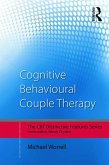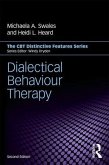What are the distinctive theoretical and practical features of acceptance and commitment therapy?
Acceptance and commitment therapy (ACT) is a modern behaviour therapy that uses acceptance and mindfulness interventions alongside commitment and behaviour change strategies to enhance psychological flexibility. Psychological flexibility refers to the ability to contact the present moment and change or persist in behaviour that serves one's personally chosen values.
Divided into two sections, The Distinctive Theoretical Features of ACT and The Distinctive Practical Features of ACT, this book summarises the key features of ACT in 30 concise points and explains how this approach differs from traditional cognitive behaviour therapy.
Acceptance and Commitment Therapy provides an excellent guide to ACT. Its straightforward format will appeal to those who are new to the field and provide a handy reference tool for more experienced clinicians.
Acceptance and commitment therapy (ACT) is a modern behaviour therapy that uses acceptance and mindfulness interventions alongside commitment and behaviour change strategies to enhance psychological flexibility. Psychological flexibility refers to the ability to contact the present moment and change or persist in behaviour that serves one's personally chosen values.
Divided into two sections, The Distinctive Theoretical Features of ACT and The Distinctive Practical Features of ACT, this book summarises the key features of ACT in 30 concise points and explains how this approach differs from traditional cognitive behaviour therapy.
Acceptance and Commitment Therapy provides an excellent guide to ACT. Its straightforward format will appeal to those who are new to the field and provide a handy reference tool for more experienced clinicians.
"Overall, Flaxman and colleagues do an excellent job of describing the ACT concepts, techniques, and strategies and how they can be practically applied. This volume will be beneficial to clinicians who are new to the field, as well as to those experienced clinicians who want to gain more in-depth knowledge." - PsycCRITIQUES, Vol 56, October 2011
"This well-written, concise text on ACT is an important resource for psychotherapists and students in the psychological and psychiatric fields. It provides a relevant beginning for further study of this behavior and mindfulness cognitive therapy... this book highlights another promising therapeutic method available for advancing human well-being." - Cynthia R. Pfeffer, Journal of Clinical Psychology, Vol 73, November 2012
"This well-written, concise text on ACT is an important resource for psychotherapists and students in the psychological and psychiatric fields. It provides a relevant beginning for further study of this behavior and mindfulness cognitive therapy... this book highlights another promising therapeutic method available for advancing human well-being." - Cynthia R. Pfeffer, Journal of Clinical Psychology, Vol 73, November 2012
"Overall, Flaxman and colleagues do an excellent job of describing the ACT concepts, techniques, and strategies and how they can be practically applied. This volume will be beneficial to clinicians who are new to the field, as well as to those experienced clinicians who want to gain more in-depth knowledge." - PsycCRITIQUES, Vol 56, October 2011
"This well-written, concise text on ACT is an important resource for psychotherapists and students in the psychological and psychiatric fields. It provides a relevant beginning for further study of this behavior and mindfulness cognitive therapy... this book highlights another promising therapeutic method available for advancing human well-being." - Cynthia R. Pfeffer, Journal of Clinical Psychology, Vol 73, November 2012
"This well-written, concise text on ACT is an important resource for psychotherapists and students in the psychological and psychiatric fields. It provides a relevant beginning for further study of this behavior and mindfulness cognitive therapy... this book highlights another promising therapeutic method available for advancing human well-being." - Cynthia R. Pfeffer, Journal of Clinical Psychology, Vol 73, November 2012








